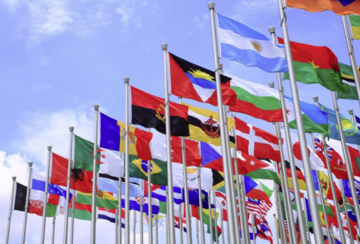Cyber Policy Center
September 25-26 | Trust & Safety Research Conference
The CPC's Trust and Safety Research Conference focuses on research in trust and safety for those in academia, industry, civil society, and government. Applications to present at the conference are open now!
LATEST NEWS FROM THE CPC

We analyzed a now-suspended network of Facebook Pages, Groups, and profiles linked to individuals in Yemen. We found accounts that impersonated government ministries in Saudi Arabia, posts that linked to anti-Houthi websites, and pro-Turkish Pages and Groups.
RT en Español leaves coronavirus-related disinformation to other sites in the Russia-aligned information space.
A new partnership with Stanford Internet Observatory, the Program on Democracy and the Internet, DFRLab, Graphika and the University of Washington's Center for an Informed Public will tackle electoral disinformation in real time as we strive for a healthy and successful election.
The white paper, in collaboration with the Hoover Institution, dives into China’s capabilities and raises an important question: how do states with full-spectrum propaganda capabilities put them to use in modern-day information operations? We examine 3 case studies: Hong Kong's 2019-2020 protests; Taiwan’s 2020 election; and COVID-19.
Google, Facebook, YouTube and Instagram feature suicide prevention resources on English language searches in the US, but are those resources available to a broader audience? Performance varies across countries and languages and supportive content appears more frequently in wealthy European and East Asian countries and less frequently other regions.

Protecting Individual Isn't Enough When the Harm is Collective. A Q&A with Marietje Schaake and Martin Tisne on his new paper The Data Delusion.
On Monday, June 30, 2020, Reddit updated its policy on hate speech. As part of research for a forthcoming book based on the Stanford Internet Observatory’s Trust and Safety Engineering course, we present a comparative assessment of platform policies and enforcement practices on hate speech, and discuss how Reddit fits into this framework.
On June 12, 2020, Twitter removed 1,152 accounts attributed to Current Policy, “a media website engaging in state-backed political propaganda within Russia.” These accounts were taken down because they violated Twitter’s policy on platform manipulation. Our latest white paper analyzes their activities and motivations.

China has been shipping medical supplies to countries battling the coronavirus pandemic, an effort dubbed “mask diplomacy.” It remains to be seen if China will be able to tailor its messages effectively to win hearts and minds of people around the world.

In the rush to develop national strategies on artificial intelligence, a new report finds, most governments pay lip service to civil liberties.
On June 3, 2020 Twitter shared with the Stanford Internet Observatory three distinct takedown datasets from China, Turkey and Russia. In this post and in the attached white papers on the China and Turkey operations, we look at the topics and tactics of these operations.
As the coronavirus pandemic spread around the world, RT’s English-language branches worked to undermine lockdown measures in Western countries while extolling the Russian and Chinese governments’ success in containing the virus’s spread.

In the June 2020 Sabin-Aspen Vaccine Science Policy Report, "Meeting the Challenge of Vaccination Hesitancy," Stanford Internet Observatory research manager Renée DiResta and First Draft lead strategist Claire Wardle write about how anti-vaccination movements' effective storytelling helps spread misinformation online.
Digital Street Conflict
A survey of spam, state and covert activities in the U.S. during domestic unrest.
We identify hundreds of scam social media accounts across Facebook, Instagram, Twitter, LinkedIn, and TikTok targeting individuals in Nigeria. These accounts post on compromised accounts claiming to have earned money through a fake investment scheme, and encourage others to “invest”. The potential for harm is high: by one estimate thousands have been scammed.


On May 28th, President Trump signed an executive order threatening to revoke CDA 230 protections, which would expose social media companies to increased liability for content that is posted on their sites. The Cyber Policy Center team responded on June 1 in a public webinar. The event was recorded.
As the COVID-19 pandemic continues, the effects could be potentially devastating to global democracy and the upcoming U.S. election. On the World Class podcast, Larry Diamond and Nathaniel Persily discuss what needs to be done to ensure a healthy election in November with host Michael McFaul.
The Stanford Internet Observatory's Virality Project is a new global study aimed at understanding disinformation dynamics specific to the COVID-19 crisis. As the pandemic became the primary concern of almost every nation on the planet, the virus significantly shifted the landscape for viral mis- and disinformation.































